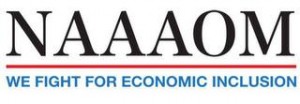
The National Association of African American Owned Media filed a $10 billion lawsuit Dec. 3 against AT&T and DirecTV for alleged racial discrimination in their contracting.
“It is appalling, deeply upsetting and totally unacceptable now and moving forward that economic exclusion of 100 African American-owned media continues to be perpetuated by these behemoth media conglomerates and their persistent, rigid refusal to contract with 100 African American owned media,” said Mark DeVitre, president of NAAAOM, in a statement.
DeVitre added that if the companies to do not respond promptly to the lawsuit and make efforts to resolve the problems, the association will call for the resignation of several of the companies’ executives. “In addition, we will organize nationwide boycotts to disconnect all AT&T and DirecTV services,” he continued.
The complaint, which was filed in a federal court in the Central District of California, accuses the media giants of violating section 1981 of the Civil Rights Act of 1866, which enshrined the right of all Americans to make and enforce contracts, and prohibits discrimination in the formation of contracts and in all aspects of the contractual relationship.
“For AT&T and DirecTV, it is a one-way street,” the complaint reads. “While these companies take billions from the African American community, they pay 100 African American–owned media very little or nothing.”
According to NAAAOM, if AT&T’s acquisition of DirecTV is approved by federal regulators, it is poised to become the largest pay-television operator in the country. Yet, of the estimated $22 billion the companies spend on cable channel carriage license fees and advertising each year, less than $3 million—less than 0.01 percent—is allocated to wholly Black-owned media firms.
Putting it in perspective, NAAAOM asserts that in 2013, the companies’ chief executive officers’ combined earnings were at least 10 times more than what the firms paid to 100 percent African-American owned media during the same year.
At least one Black-owned network provider has been trying to get its suite of channels carried by AT&T and DirectTV, the lawsuit alleges, but AT&T executives supposedly said they would not unless the government forces the company to do business with 100 percent African-American–owned media in connection with its acquisition of DirecTV.
Even with federal oversight, media conglomerates have gotten away with shunning minority-owned firms for years, NAAAOM asserts.
“White-owned media has deceptively worked hand-in-hand with governmental regulators to perpetrate the exclusion of 100 African American owned media from being paid for channel carriage. This has been done through, among other things, the use of ‘tokens’ and ‘window dressing’—African American celebrities posing as ‘fronts’ or ‘owners’ of channels, which are truly owned by White-owned media, and by way of ineffectual, sham ‘diversity agreements’ with non-media groups and individuals,” the lawsuit claims.
Contracts with multichannel video programming distributors like AT&T and DirecTV are necessary for Black-owned media companies to not only realize subscriber and advertising revenue, but also to offer more diversity in programming, NAAAOM stated.
“This lawsuit presents a unique and important opportunity for our justice system to address and eradicate racial discrimination against 100 African American-owned media companies,” said Skip Miller, partner at the Miller Barondess law firm in Los Angeles and lead trial counsel for the plaintiff. “I look forward to presenting our case in court, explaining it to the jury and obtaining an appropriate remedy for the wrongful way AT&T and DirecTV have operated their businesses.
“100 African American-owned media companies have been egregiously harmed and we look forward to obtaining justice for them,” he added.


